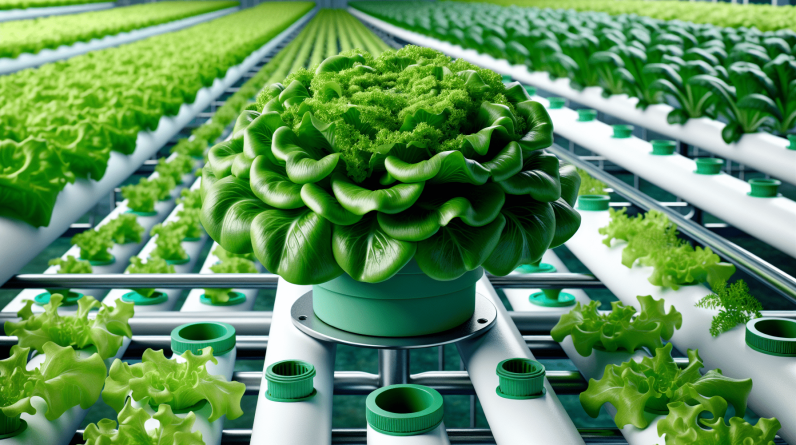
Can Hydroponic Farming Help Fight Climate Change?

This image is property of images.unsplash.com.
Introduction to Hydroponic Farming
If you’re looking for a sustainable and efficient way to grow crops, hydroponic farming might be the solution for you. This innovative method eliminates the need for soil and conserves water, making it an environmentally friendly option for modern gardening. But can hydroponic farming also play a role in fighting climate change? Let’s explore the potential impact of hydroponics on our environment.
What is Hydroponic Farming?
Hydroponic farming is a method of growing plants without soil, using a nutrient-rich water solution instead. This soilless approach allows plants to receive the essential nutrients they need directly at the root level, promoting faster growth and higher yields. By eliminating soil from the equation, hydroponic systems save water, reduce the risk of diseases and pests, and enable year-round cultivation.
Benefits of Hydroponic Farming
Hydroponic growing systems offer various advantages over traditional soil gardening methods. By providing a controlled environment for plant growth, hydroponics allow for greater efficiency and productivity. They require less space, use significantly less water, and can produce more crops in a shorter amount of time. Furthermore, hydroponic systems reduce the use of harmful pesticides and herbicides, leading to healthier and chemical-free produce.
Environmental Impact of Hydroponic Farming
One of the key benefits of hydroponic farming is its positive impact on the environment. By conserving water and eliminating the need for soil, hydroponic systems reduce the overall carbon footprint of agriculture. Traditional farming practices often contribute to deforestation, soil erosion, and water pollution, all of which are major contributors to climate change. In contrast, hydroponic farming offers a more sustainable and eco-friendly alternative that can help mitigate these environmental concerns.

This image is property of images.unsplash.com.
Water Conservation in Hydroponic Farming
Water conservation is a critical issue in agriculture, especially in regions facing water scarcity. Hydroponic farming uses up to 90% less water than traditional soil-based gardening, making it a highly efficient and sustainable method of crop cultivation. By recycling and reusing water in closed-loop systems, hydroponic farms minimize water wastage and optimize resource use. This not only benefits the environment but also helps farmers reduce their water bills and operating costs.
Energy Efficiency in Hydroponic Farming
In addition to water conservation, hydroponic farming is also energy-efficient compared to traditional farming methods. By controlling the lighting, temperature, and humidity levels in indoor hydroponic systems, growers can minimize energy consumption and maximize crop production. LED lights, for example, are commonly used in hydroponic setups to provide optimal lighting conditions for plant growth while using less electricity. This energy-efficient approach reduces greenhouse gas emissions and helps combat climate change.

This image is property of images.unsplash.com.
Climate Resilience of Hydroponic Farming
Climate change is causing increasingly unpredictable weather patterns and extreme environmental conditions, posing challenges to traditional farming practices. Hydroponic farming offers a solution by providing a controlled growing environment that is not dependent on external weather conditions. By cultivating crops indoors or in greenhouses, growers can ensure year-round production and protect their harvests from climate-related risks such as droughts, floods, or temperature fluctuations. This climate-resilient approach makes hydroponic farming a viable strategy for food security in a changing climate.
Soil Health and Fertility in Hydroponic Farming
Another significant advantage of hydroponic farming is the absence of soil-borne diseases and pests, which are common in traditional agriculture. Without soil as a medium for plant growth, hydroponic systems eliminate the risk of soil contamination and reduce the need for chemical pesticides. This not only promotes healthier plants but also preserves soil health and fertility for future generations. By focusing on nutrient-rich water solutions, hydroponic farming prioritizes plant nutrition and growth without compromising soil integrity.
Nutrient Management in Hydroponic Farming
In hydroponic farming, nutrient management plays a crucial role in ensuring the health and productivity of plants. Growers must carefully balance and monitor the nutrient levels in the water solution to meet the specific requirements of different crops at various growth stages. This precise control over nutrient uptake allows for optimal plant development and higher yields. By adjusting the nutrient composition based on plant needs, hydroponic farmers can maximize nutrient absorption and minimize nutrient wastage, resulting in efficient resource use and sustainable crop production.
Community Benefits of Hydroponic Farming
Beyond its environmental advantages, hydroponic farming also offers social and community benefits. By providing fresh, locally grown produce year-round, hydroponic farms contribute to food security and nutritional diversity in urban areas. These indoor farming facilities create job opportunities, support small-scale farmers, and promote sustainable agriculture practices. Additionally, hydroponic farming can be integrated into educational programs to raise awareness about sustainable food production and environmental stewardship. By engaging with the community, hydroponic farms can foster a sense of connection and shared responsibility towards building a more resilient and sustainable food system.
Future Outlook for Hydroponic Farming
As we face the challenges of climate change and environmental degradation, the need for sustainable farming practices has never been more urgent. Hydroponic farming offers a promising solution that combines innovation, efficiency, and environmental stewardship to address these pressing issues. By harnessing the power of technology and scientific knowledge, hydroponic systems can continue to evolve and expand, providing a viable alternative to traditional agriculture. Whether in urban settings, remote regions, or areas facing climate vulnerabilities, hydroponic farming has the potential to revolutionize food production and contribute to a more sustainable future for generations to come.
Conclusion
In conclusion, hydroponic farming has the potential to help fight climate change by offering a sustainable and efficient method of crop cultivation. By conserving water, reducing energy consumption, and promoting climate resilience, hydroponic systems can mitigate the environmental impact of agriculture and contribute to a more sustainable food system. As we strive to address the challenges of climate change and ensure food security for all, hydroponic farming stands out as a viable solution that combines innovation, technology, and environmental responsibility. By embracing hydroponics, we can take meaningful steps towards building a greener, healthier, and more resilient future for our planet.










